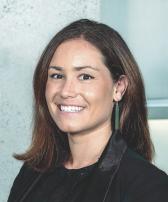The Trustees of the Yvonne A M Smith Charitable Trust are pleased to announce that the winner of the 2018 scholarship is Rachael Jones.
Rachael completed her Law Degree at Otago University and from there became a Judges Clerk. Since 2016 she has been a solicitor for a top New Zealand law firm within their litigation team.
During her time at Otago University, Rachael was both a tutor and mentor for other Maori students which deepened her understanding of indigenous disempowerment. Rachael will be focussing her studies towards indigenous rights and hopes to return to New Zealand to practise indigenous litigation.
Rachel is currently studying at Columbia University, USA. Below is an update from Rachael about her time spent at Columbia Law School.
“Arriving in New York City in August, I was greeted not only with a hot and humid concrete jungle, but also an exciting and challenging academic year as a member of the class of 2019 LLM program at Columbia Law School. Receiving the Yvonne A M Smith Scholarship was a determining factor in my decision to attend Columbia University, and I am very grateful for the Trust’s support for my postgraduate studies.
This report updates the Trust on the Fall semester at Columbia, both inside and outside the classroom.
The first day of Columbia Law School (CLS) orientation left me with no doubt that the LLM would provide a challenging and rewarding experience. After working as a lawyer for several years after graduating from the University of Otago, I quickly swapped client-led litigation work for critical thinking and in-depth reading on issues that I am passionate about.
During the Fall semester I studied Human Rights, Native American Law and American Jurisprudence. I was also fortunate enough to participate in an exchange at NYU Law School, where I studied American Legal History. Each of these courses was taught my a leading academic or practitioner in their field, which is the norm at such a high calibre institution like Columbia. For example, the Human Rights course was taught by Professor Sarah Cleveland who is the United States independent expert on the United Nations Human Rights Committee, the international body that monitors states’ compliance with the International Covenant on Civil and Political Rights. Professor Amal Clooney, a leading international human rights barrister, taught the international criminal justice and advocacy section of the course. During Professor Clooney’s time, we live-streamed a lecture with digital privacy advocate Edward Snowden. My American jurisprudence course was taught by Judge Richard Sullivan, who was recently confirmed as a Judge of the United States Court of Appeals for the Second Circuit.
Despite studying a broad range of topics, there were common threads among the courses. One that resonates is the sense of connection Americans have with the history of their nation, and how prevalent that history is in everyday life. American law and the Constitution are much more proximate and consequential to Americans than, for example, the Treaty of Waitangi or the New Zealand Bill of Rights Act are to New Zealanders.
There were challenging experiences, too. For example, CLS students – particularly the American students – reacted viscerally to the allegations of sexual assault by Supreme Court Justice nominee Brett Kavanaugh. The Senate Judiciary Committee hearings were streamed live at the law school, and student associations organised robust debates and town hall meetings to discuss the issues the hearings raised for students. The sense of community during a tense legal and political time solidified for me that CLS is a place where there is an expectation that all points of view can and should be aired and debated.
Outside the classroom, I joined the Executive Board of the Native American Law Students Association (NALSA). NALSA advocates for and publicises Native American legal issues, and organises events with leading scholars and practitioners. I was fortunate to participate in a panel on Columbus Day/Indigenous Peoples’ Day, where I spoke about the significance of Waitangi Day. The NALSA Board also volunteered for a non-partisan organisation called Native Vote, at polling places on Pine Ridge Indian Reservation in South Dakota for the midterm elections. Our role was to ensure that voters, who were predominantly Native American, were able to exercise their constitutional right to vote. Midterm election statistics show that more Native Americans voted in this election than the 2016 presidential election, signalling a successful effort by Native Vote.
Outside of NALSA, I attended an Ojibwe language immersion weekend in Duluth Minnesota, organised by a language revitalisation organisation of Anishinaabe Indians. The experience was similar to a Te Reo Māori wananga, where speaking English is discouraged. During the weekend I communicated in Te Reo Māori and French, and learned a great deal about Anishinaabe culture, including some similarities to Māori customs and traditions.
I was also fortunate enough to meet with Prime Minister Jacinda Ardern, who met with New Zealand students studying at Columbia University. We discussed prisoner voting rights, climate change and motivating young people to get into politics. This meeting with the Prime Minister drove home the value that my studies at Columbia will have upon my return to New Zealand later in 2019.
While the Fall semester has been busy and full, I anticipate the Spring semester will be even more so. I will participate in an internship at the Knight First Amendment Institute, a research and litigation institute dedicated to protecting freedom of expression in the digital age. An example of Knight’s work is the ongoing case against President Trump and his ‘blocking’ of a number of followers on his Presidential Twitter account. I will also study Economic, Social and Cultural Rights, where I look forward to researching how these rights can be better realised for Māori.
Once again, I thank Yvonne and the Trust for their continued support for this defining and eye-opening year for me personally and professionally. I look forward to providing an update after my Spring semester.”
